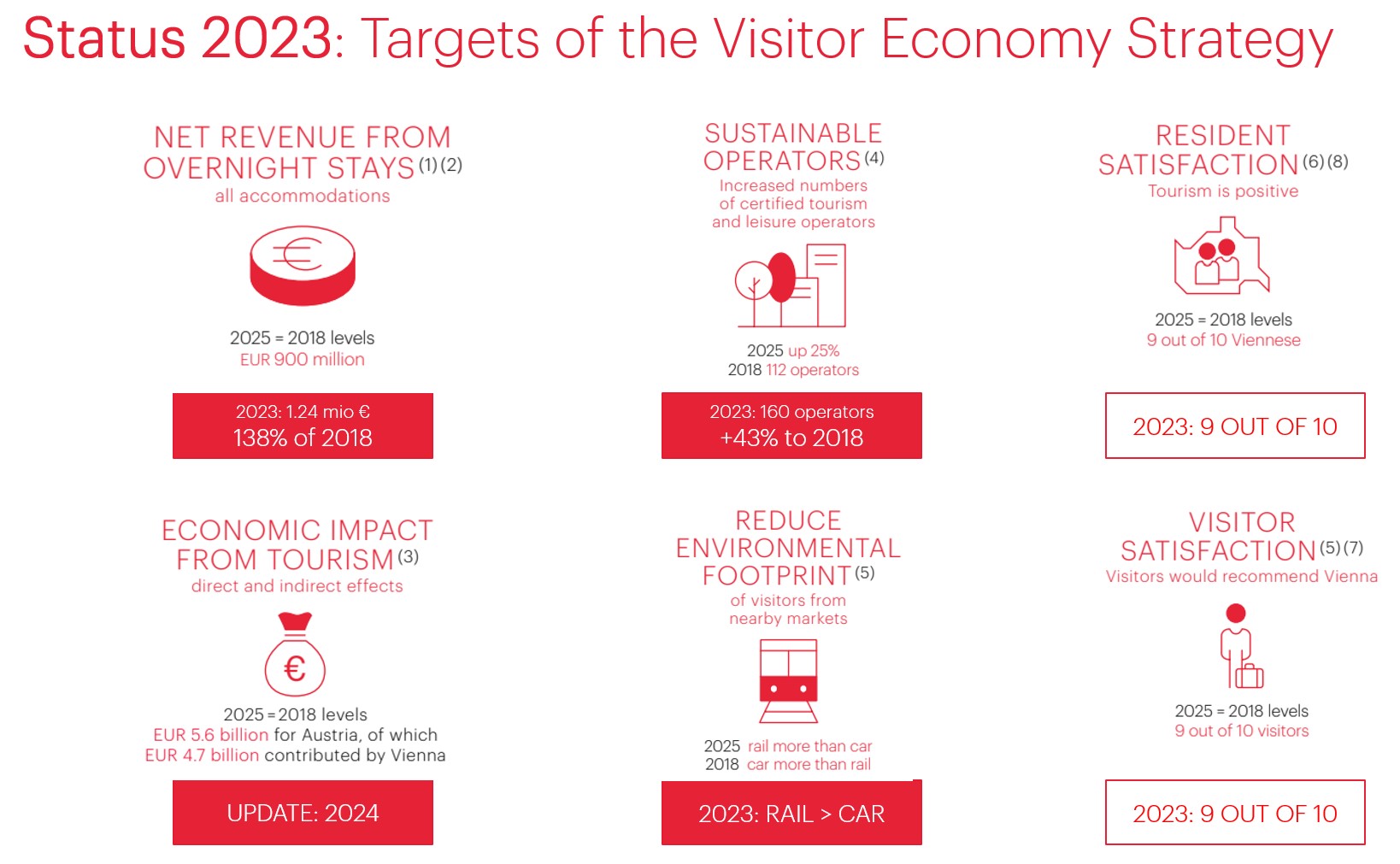Roadmap for the Future
A defining element of the Vienna Tourist Board’s future development, environmental, economic and social sustainability is also reflected in each of the objectives set out in the Visitor Economy Strategy, which was presented in October 2019. Just a few months after the City of Vienna unveiled its Vienna Tourist Board-led strategy, the COVID-19 pandemic triggered the biggest crisis the international tourism industry had ever faced. Many of the approaches that had been adopted during times of growth proved to be every bit as relevant as the capital made its way out of the crisis. As a result, the fundamental principles remained the same, even though some of the quantitative targets that were set before the outbreak of the pandemic were aligned to reflect the change in circumstances.
Six Objectives to Measure Progress
Vienna's Visitor Economy Strategy sets out six goals to be achieved by 2025. Direct and indirect economic impact induced by tourism in Vienna and Austria to return to 2018 levels by 2025: EUR 5.6 billion for Austria, of which EUR 4.7 billion contributed by Vienna (objective no. 1). This is calculated using data from the Regional Tourism Satellite Account of Statistics Austria and WIFO (Austrian Institute of Economic Research), which also makes it possible to compare tourism destinations with one another. In 2018, Vienna was the second strongest province in Austria (after Tyrol and ahead of Salzburg) for tourism in terms of value added and tourism spending. Net revenue from overnight stays generated by the accommodation industry – a core sector of the visitor economy – to return to its pre-crisis (2018) total of around EUR 900m by 2025 (objective no. 2). This target was reached in 2023 – with net overnight sales reaching EUR 1.24 billion. The top ratings in terms of quality of visitor experience (nine out of ten people would recommend Vienna to others) and residents’ attitudes to tourism (nine out of ten see tourism as positive for Vienna) should be maintained (objectives no. 3 and 4). Both key indicators remained stable at this level in 2023. Performance is monitored through the regular Tourismus Monitor Austria survey and the annual poll of around 3,600 residents of Vienna on acceptance of tourism conducted on behalf of the Vienna Tourist Board.
Another focus is the continued reduction of the environmental footprint attributable to tourism and continuing to expand Vienna’s pioneering role as far as eco-certification within the visitor economy is concerned. In 2023, around a fifth (18%) of all Austrian ecolabel-certified accommodation providers were located in Vienna, with the capital also accounting for around 34% of the nation’s certified beds at the end of 2023. Under the Visitor Economy Strategy, by 2025 the number of hotels and other tourism institutions – from museums to restaurants – that are certified with the ecolabel or an equivalent, internationally recognized environmental certificate should increase by 25% to 140 (objective no. 5). By way of reference, the number of certified establishments has already increased from 112 in 2018 to 160 in 2023. To help achieve this, the Vienna Tourist Board is increasingly profiling providers that offer sustainable travel experiences, and has itself launched a number of initiatives. In one such example, the Vienna City Card was awarded the Austrian ecolabel in 2022 for its environmentally friendly mobility offering. In future, only certified accommodation partners will be able to qualify as card affiliates.
In line with the objectives set out in the Visitor Economy Strategy, travel by environmentally friendly means of transport should be promoted, especially from nearby markets. By 2025 the goal is to reverse the proportions of visitors who arrive by car (2018: 26%) and by train (2018: 21%) (objective no. 6). In 2023, road and rail accounted for roughly equal shares (at around 23% and 31% respectively; fluctuation range: ±2.5%). 39% of visitors traveled to the city by plane in 2023. In addition to a concerted effort to encourage more visitors to travel by rail, the Vienna Tourist Board continues to put the emphasis on air travel in Vienna's tourism modal split when it comes to long-haul markets. The Vienna Tourist Board itself has been offsetting emissions from its own business trips involving air travel through the Climate Austria initiative since 2020.
Focus on Added Value and Quality
In 2023, the Vienna Tourist Board actively targeted 13 source markets – the main factors to influence the selection process included aspects such as accessibility, purchasing power, brand conformity and relevance for the meetings industry. In addition to Germany, Austria, Switzerland, the UK, Spain, France and Italy, in 2023 the focus returned to Canada, Arab countries, China, Japan and South Korea as well as the USA. Long-haul market development activities centered on the USA, which is Vienna's highest-volume and highest-revenue overseas market.
Membership of international networks such as UN Tourism, the City Destinations Alliance, the World Tourism Cities Federation and the International LGBTQ+ Travel Association is a cornerstone of the Vienna Tourist Board's strategy, as is the Vienna Convention Bureau’s membership of the International Congress and Convention Association (ICCA) and the Professional Convention Management Association (PCMA), among other organizations.


